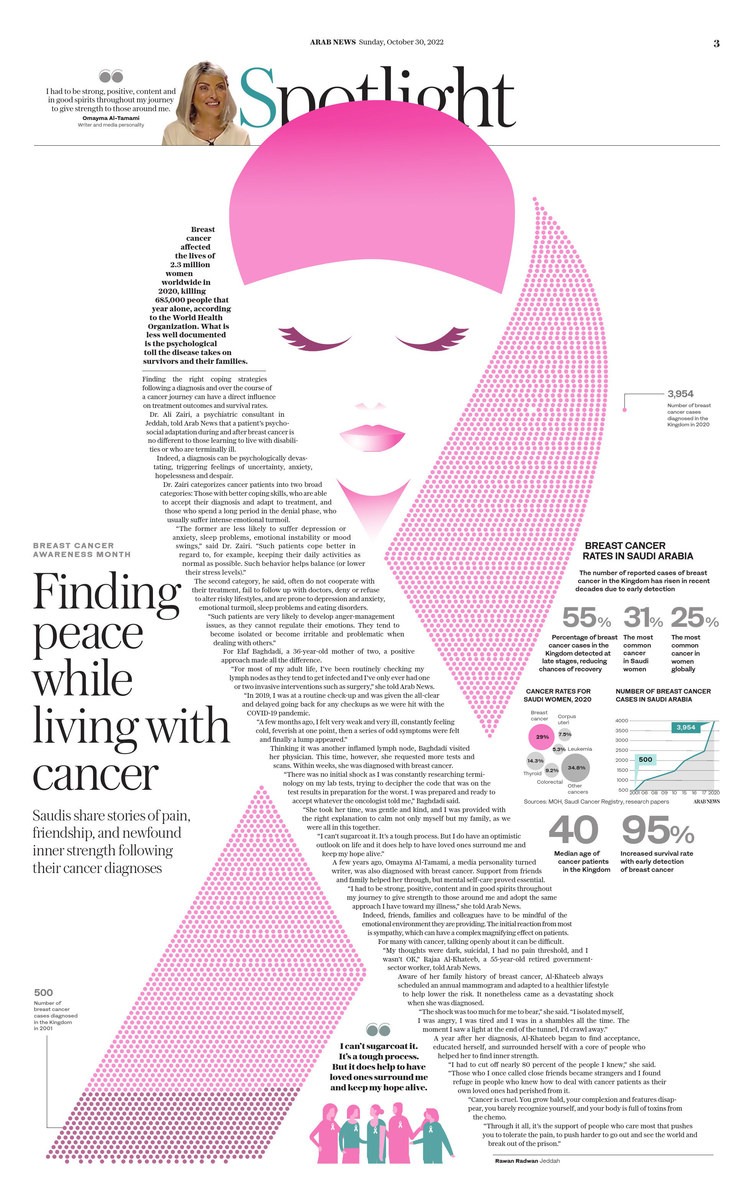JEDDAH: Breast cancer affected the lives of 2.3 million women worldwide in 2020, killing 685,000 people this year alone, according to the World Health Organization. What is less well documented is the psychological toll the disease takes on survivors and their families.
In Saudi Arabia, breast cancer accounts for 31% of all cancer diagnoses, making it the most common form of the disease. Although mammography was introduced in the Kingdom in 2002, 55% of cases are detected at a late stage, which reduces the chances of a cure.
Several studies indicate that 20-30% of women diagnosed, treated and declared free of local or regional invasive breast cancer will suffer a recurrence. So there is a constant fear among survivors that their cancer could come back.
Finding the right coping strategies after a diagnosis and during a cancer journey can have a direct influence on treatment outcomes and survival rates.
Cancer has a significant impact on all spheres of life, causing a variety of emotional and behavioral responses, meaning there is no ‘one size fits all’ approach to helping patients cope.
Dr Ali Zairi, a psychiatric consultant in Jeddah, told Arab News that a patient’s psychosocial adjustment during and after breast cancer is no different from that of those learning to live with a disability or who are in the terminal phase.
Indeed, a diagnosis can be psychologically devastating, triggering feelings of uncertainty, anxiety, hopelessness and hopelessness. Psychological distress, including depression, is common.
Dr. Zairi classifies cancer patients into two broad categories: those with better coping skills, who are able to accept their diagnosis and adapt to treatment, and those who spend a long time in the phase. of denial, who usually suffer from intense emotional disturbances.
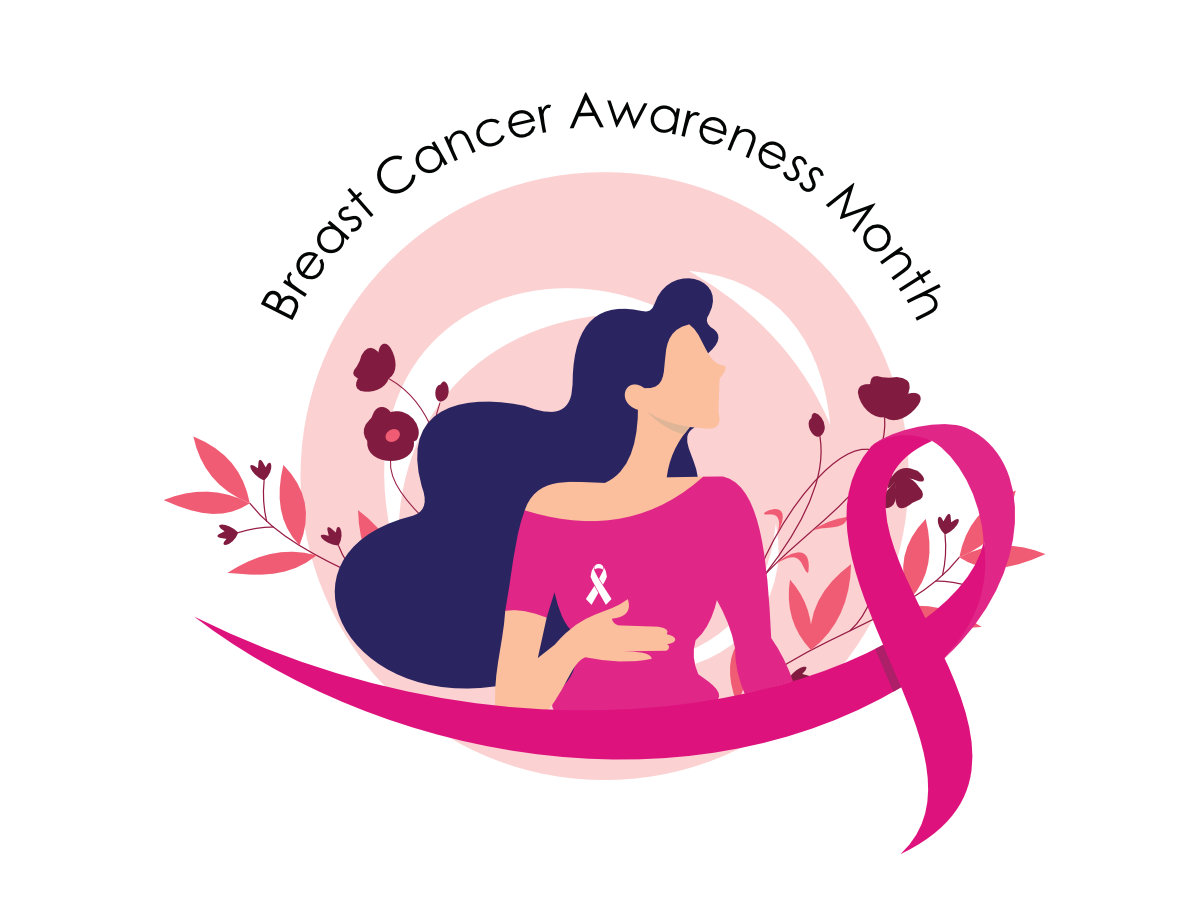
Image Shutterstock
“The former are less likely to suffer from depression or anxiety, sleep problems, emotional lability or mood issues,” Dr. Zairi said. “These patients do better, for example, keeping their daily activities as normal as possible. Such behavior helps to balance their stress or dampen their stress to the lowest possible degree. »
The latter, he said, often do not cooperate with their treatment, do not follow doctors, deny or refuse to stop risky lifestyles and are prone to depression and anxiety, emotional problems, sleep problems and eating disorders.
“These patients are very likely to develop poor anger management because they cannot regulate their emotions. They tend to be isolated or become irritable and problematic when dealing with others.
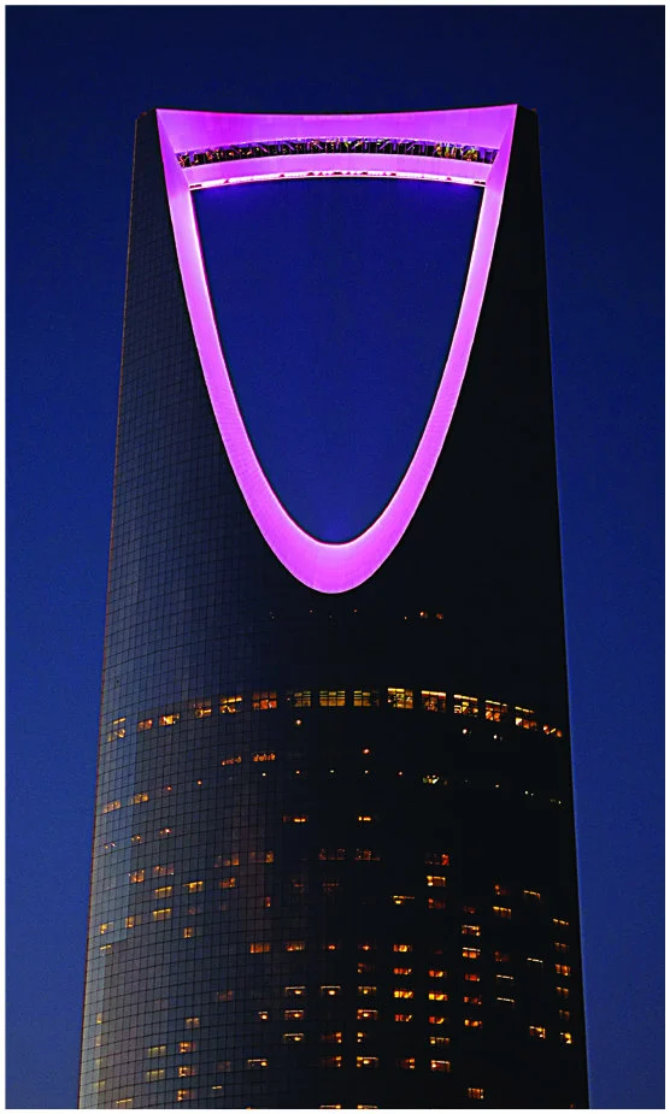
Every year, Riyadh’s iconic Kingdom Tower turns pink to help promote breast cancer awareness. (A file photo)
For Elaf Baghdadi, a 36-year-old mother of two, it never occurred to her that her history of lymphadenitis, an infection of one or more lymph nodes, could lead to a more serious problem.
“For most of my adult life I have had my lymph nodes checked regularly as they tend to get infected and I have only had one or two invasive procedures such as surgery,” he said. she told Arab News.
“In 2019 I was on a routine checkup and was given the all clear and delayed return for any checkups as we were impacted by the COVID-19 pandemic.
“A few months ago I felt very weak and very sick, I was constantly cold, I had a fever at one point, then a series of strange symptoms were felt and finally a lump appeared and it was c was strange enough to raise my concern but only by a fraction.”
Thinking it was another inflamed lymph node, Baghdadi visited his doctor over the summer. This time, however, she asked for more tests and analysis, “to make sure”. Within weeks, she was diagnosed with breast cancer.
“There was no initial shock as I was constantly researching my lab test terminology, trying to crack the code that was on the test results in anticipation of the worst. I was prepared and ready to accept everything the oncologist told me.
“She took her time, was sweet and kind, and provided me with the right explanation to calm not only myself but my family as we were all in this together.”
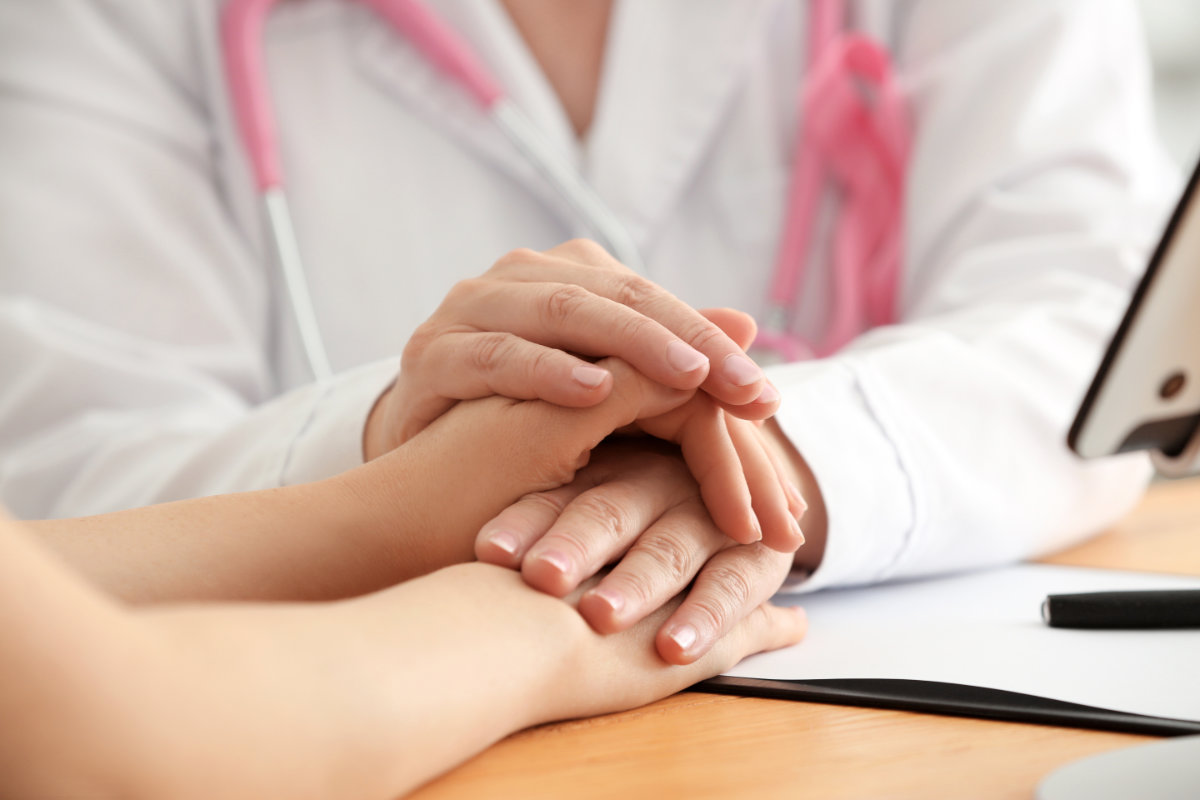
A diagnosis can be psychologically devastating, says psychiatrist Ali Zairi. (Image Shutterstock)
It is thanks to her calm demeanor that Baghdadi was able to meet the challenges of diagnosis, biopsy, surgeries and treatments.
“The first time I broke down was right after my mastectomy. It was the second day, I had the Quran playing next to me, and a verse broke my tears,” he said. she says.
“I knew it was going to be tough and I was ready, but you can never be ready enough. A short verse reminded me of how weak we are as humans and it played with my psyche.
“I can’t water it down. It is a difficult process. And in my case, one thing led to the next. I have to start my chemotherapy by the end of the month. But I have an optimistic outlook on life and it helps me to have loved ones around me and to keep my hope alive,” she said.
A few years ago, Omayma Al-Tamami, a media personality turned writer, also began a battle with breast cancer, which was discovered late due to misdiagnosis. Support from friends and family helped, but mental self-care proved essential.
“I had to be strong, positive, happy and in good spirits throughout my journey to give strength to those around me and take the same approach I have towards my illness,” she said. at Arab News.
Indeed, friends, families and colleagues need to be aware of the emotional environment they provide to cancer patients. The initial reaction for most is sympathy, which can have a complex magnifying effect on patients.
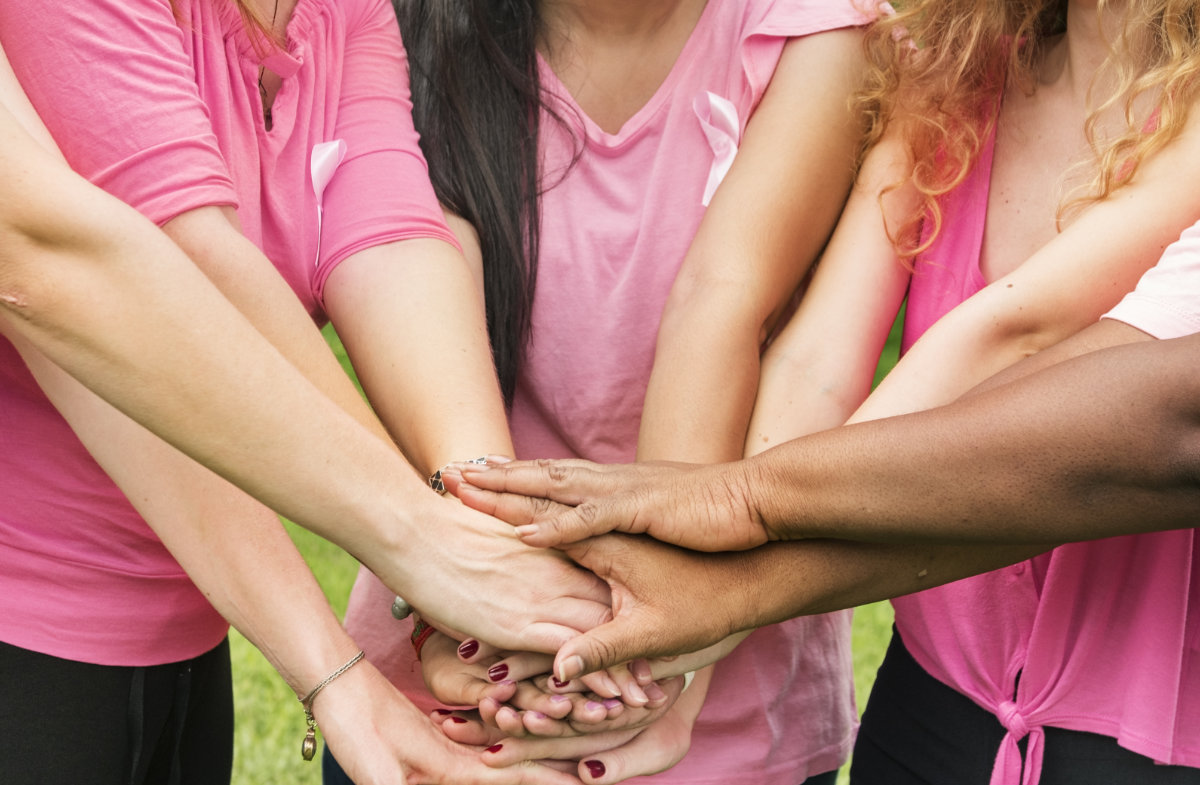
Support from the people who care most can help cancer patients tolerate pain, says survivor. (Image Shutterstock)
Al-Tamami says cancer patients don’t need pity. Instead, they need an honest and open conversation to address the illness head-on.
For some, however, such open conversation is easier said than done.
“My thoughts were dark, suicidal, I had no pain threshold and I was not well,” Rajaa Al-Khateeb, a 55-year-old retired public sector worker, told Arab News.
Aware of her family history of breast cancer, Al-Khateeb has always scheduled an annual mammogram and adapted to a healthier lifestyle to help reduce the risk. It was nonetheless a devastating shock when she was diagnosed.
“The shock was too much for me to bear,” she said. “I isolated myself, I was angry, I was tired and I was in shambles all the time. The moment I saw a light at the end of the tunnel, I was crawling.
A year after her diagnosis, Al-Khateeb began to be accepted, trained and surrounded herself with a core group of people who helped her find her inner strength.
“I must have cut almost 80% of the people I knew,” she said. “Those I once called close friends became strangers and I found refuge with people who knew how to care for cancer patients because their own loved ones had perished.
“Cancer is cruel. You go bald, your complexion and features fade, you barely recognize yourself, and your body is full of chemo toxins.
“Through it all, it’s the support of the people who care most that pushes you to tolerate the pain, to push harder to get out there and see the world and get out of prison.”
